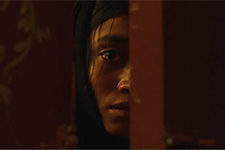In Flames
|  Part slow-burn supernatural thriller and part indictment of how women are (mis)treated in patriarchal culture, Zarrar Kahn’s feature debut In Flames is an intriguing exercise in genre convention-as-social vehicle, a role that horror and science fiction have long played. Kahn doesn’t reinvent the wheel or do anything particularly novel here, but what he does he does very well (the editing and sound design are particularly notable). And, for viewers not familiar with Kahn’s native Pakistan (although he now lives and operates out of Canada), there is much insight into long-standing cultural traditions that elevate one gender and oppress the other. The film’s tormented protagonist is a woman in her mid-20s (although she still looks like a teenager) named Mariam (Ramesha Nawal). Mariam lives with her widowed mother, Fariha (Bakhtawar Mazhar), and her smartphone-obsessed adolescent brother, Bilal (Jibran Khan), in a small apartment in Karachi. The film opens with Fariha’s father, who had been providing for them financially and was, by all accounts, a decent and honorable man, having just died. His absence creates a sense of financial and cultural uncertainty for Fariha, who works as a schoolteacher, and for Mariam, who is studying to be a doctor. It also opens a space for vultures like Uncle Nasir (Adnan Shah), who starts coming around with assurances of familial care and protection, but also with papers to sign that would turn over to him Fariha’s inheritance (including their apartment and car). While women have legal standing in Pakistan to inherit family wealth, there are long-standing cultural assumptions that a man must be in charge financially, an insidious tradition that the older Fariha has internalized, which makes her vulnerable to manipulation. Mariam, being of a younger generation, is suspicious and warns her mother about signing anything away. Meanwhile, Mariam becomes involves with Asad (Omar Javaid), a seemingly well-meaning friend of a friend who has recently returned to Pakistan from living in Canada, which suggests that he (like the writer/director) has a more progressive and modern outlook. Mariam feels the multiple burdens of helping to sustain her stressed family while also keeping up her difficult medical studies, and time with Asad is a relief, even though she feels compelled to keep the budding relationship hidden from her mother. As it turns out, there is more tragedy waiting in the wings, which renders Mariam a shell of her former self, struggling to cope with her own trauma while still balancing her other responsibilities. It is here that Kahn starts taking the film into the supernatural realm, with increasing suggestions both aural and visual that one of more ghosts is haunting both Mariam and Fariha. Taking a cue from Henry James (and Jack Clayton’s superb 1960 Turn of the Screw adaptation The Innocents), the ghosts are initially depicted as solitary figures standing in the distance, so still and unremarkable that at first they don’t even register. Interestingly, the more the film turns toward conventional horror imagery, the less effective it becomes, although Kahn should be commended for resisting the urge to let the film slip into jump-scare cliches or overly gory imagery; rather, he stays true to a more restrained approach that suggests more than it shows, often through the unnerving soundtrack and a roving camera whose drifting away from the main action always portends the presence of something frightful. Yet, nothing is so frightful as the predatory men who surround Mariam, which range from the lecherous uncle, to random men in the streets, one of whom punches through Mariam’s car window to try to grab her and one of whom catches her attention from the street below and then starts masturbating while leering at her. These grotesque attacks on Mariam—physical, psychological, and economic—create a complete portrait of the manner in which men have historically kept women oppressed to further their own interests. Because Mariam is young, well-educated, and self-aware, she poses a particular danger to patriarchal control, which is why she is attacked from so many directions. Yet, the film is not a one-note gendered screed, as it leaves room for men to display kindness and decency, although even that might be a ruse, which is what makes Mariam’s life so dangerous. Like the ghosts that begin to emerge around her, almost nothing can be trusted. Copyright © 2024 James Kendrick Thoughts? E-mail James Kendrick All images copyright © Game Theory |
Overall Rating: 

 (3)
(3)


